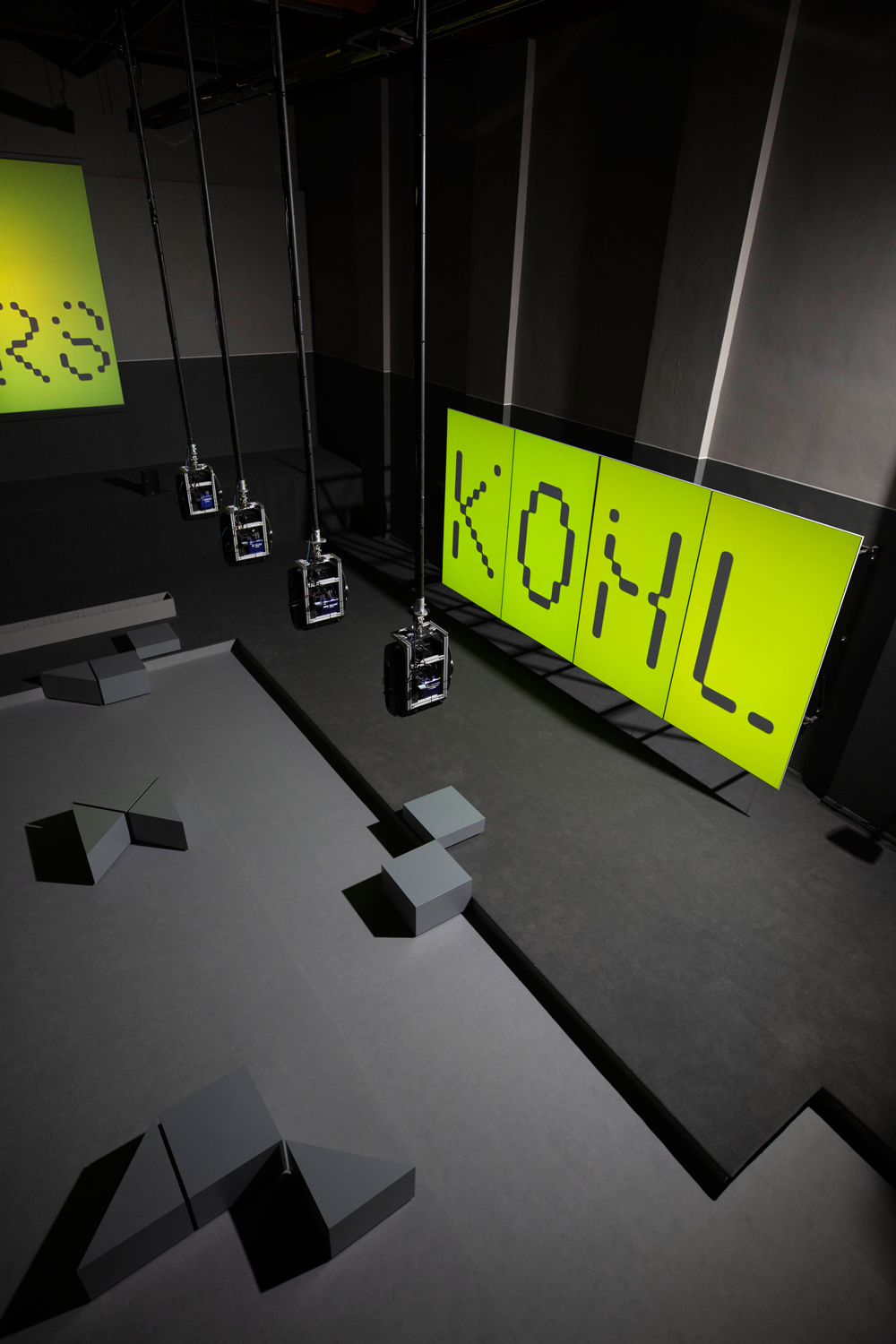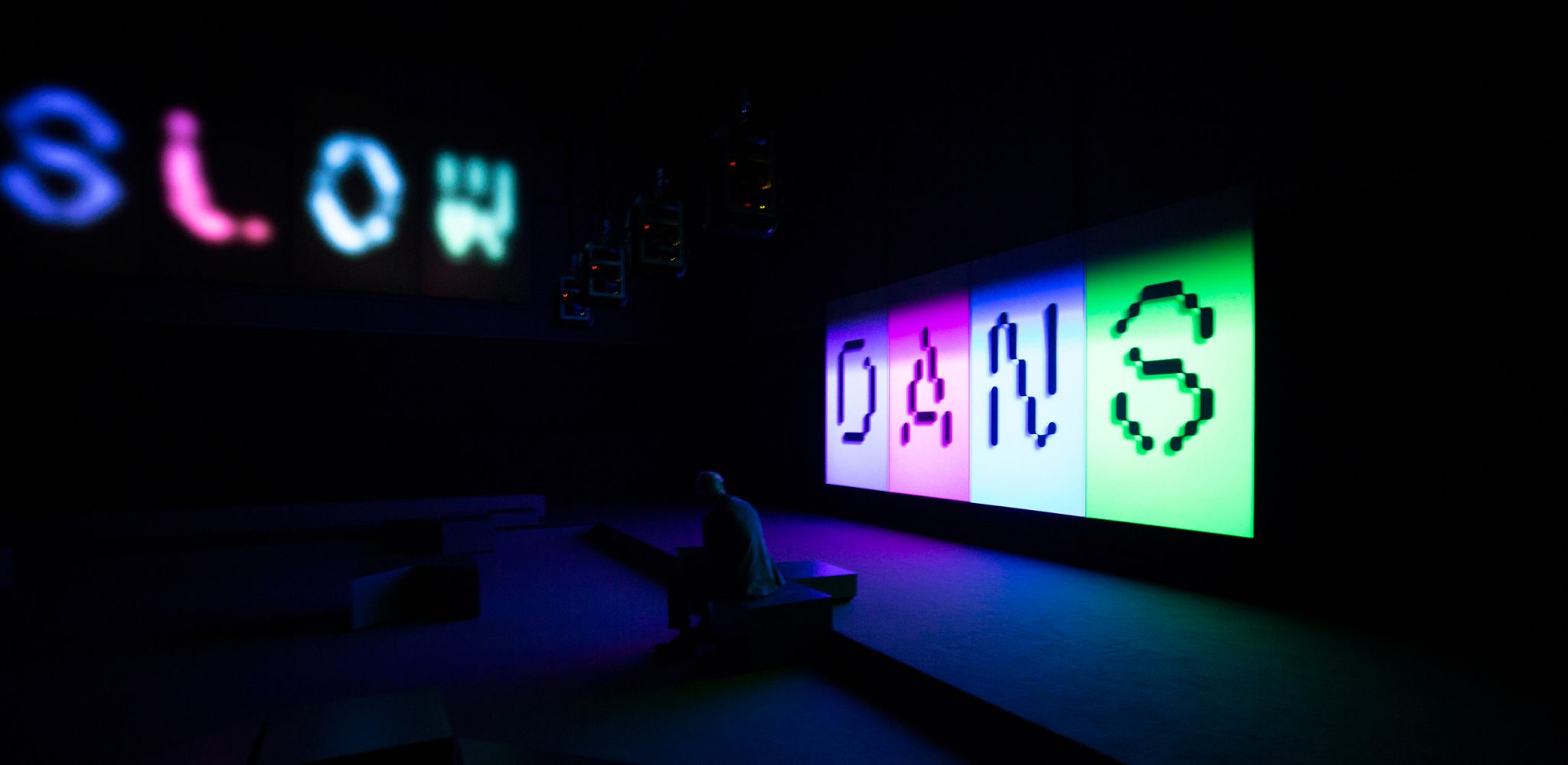The British artist’s vision of our postindustrial and technocratic world takes on a sharper edge
That this is an age of shuttered nightclubs and banned gatherings adds a bleak note to viewing SLOW DANS. Elizabeth Price’s videoworks of the last decade have often borrowed from pop music its sounds, tempo and visual glamour, as much as celebrating pop’s investment in the ecstasy of coming together in feeling rather than thinking. But Price’s works have balanced their critical fascination with the thrall of commodity culture with an increasingly research-driven attention to the social world of labour and industry, and the different register of solidarity and sociality embedded in labour and making. Seeing SLOW DANS – an iteration of Price’s most recent trilogy of videos, co-commissioned by Artangel – glowing gaudily in the cavernous space of a nineteenth-century public assembly room in South London conjures ghosts: who assembled here, once? Suffragettes? Union men? Ballroom-dancing enthusiasts? Disco divas? Political groupings?
If that sense of collectivity recedes even further in the shadow of a pandemic, its vanishing distance was already inscribed in the videos on show here before COVID-19 made its appearance. Each large, multiscreen projection contains a story narrated by various iterations of Price’s now-familiar disembodied voice-synthesisers and flickering animated captions. Quizzical, slightly catatonic in their halting reveries, they unspool fables of contemporary human life as if reconstituting these from the archaeological fragments and unreliable archives left to a perhaps distant future. In KOHL (2018), across four vertical screens occupied by the negative and inverted image of a coalmine’s pit-head tower and winch, a cursor blinks and an account is typed out ‘live’ of unexplained ‘visitants’ appearing in the underground spaces of carparks, data centres and gyms, where once they appeared in the flooded underground networks of disused mines. Ghosts of deindustrialisation (the scripts mention the closure of English collieries) troubling the anodyne venues of service-sector capitalism? Then a waving tangle of CGI ferns take over the screens. Maybe a reference to how tree ferns are the organic origin of many British coalfields; they’re also cyphers of everything lost, subterranean or repressed.

Weirdly, though, their fronds appear to carry the designs of men’s neckties – a segue to FELT TIP (2018), projected opposite. Where KOHL feels like a preamble, quietly setting the stage of this out-of-joint temporality, FELT TIP sucks us into a vortex of improbable associative leaps, linking the phallic associations of twentieth-century men’s business ties to the first digital weaving looms in a kind of hallucinatory PowerPoint presentation that charts the evolution of the necktie’s heraldic motifs and diagonal bands into what might appear as conduits, circuitry and microchips. This delirious but convincing exposition is spoken by an obscure cadre who operate in the “administrative core”; near-future middle-management, perhaps, who store data in the DNA of their fingernails, and who seem jokily obsessed with corporate aesthetics and the links between ties, textile, tactility, index fingers and tongues, having taken to wearing ties as a kind of ironic gesture of their “own long memory”. What these pedants remember, or why they remember it, is hard to decrypt from their odd collective monologue, but “things haven’t gone our way”. Underlying FELT TIP’s mannered humour is an intuition of the disintegrating relationship between material labour (the mine-head appears as the ‘below’ to the office desk’s ‘above’), managerialism and gender – a pair of bare legs in high heels appear, dance-stepping, and it takes a moment to notice their hairiness. If binaries have blurred, and patriarchy can’t get it up anymore, FELT TIP seems to suggest this has some hard-to-fathom relationship to the rise of information over production.
If FELT TIP and KOHL frame the joylessly postindustrial and technocratic world as deeply disturbed (haunted, even) by the spectre of materiality and tactility, then administration, management, information – these hegemonic aspects of twenty-first-century capitalist life – find themselves the target of THE TEACHERS (2019), which is projected between them. Here Price’s stuttering digital orators tell of a legendary group of academics who became voluntarily mute, withdrawing from their language-driven professions, and replacing their speech with nonlinguistic utterances. As the images of high-fashion dresses that resemble ceremonial robes warp and fade across the screens, the narrators offer the idea that the sibilant phonemes the ‘teachers’ utter are really renderings of the everyday noises of their abandoned day-jobs – mouse clicks, keyboard clatter, the shuffling of documents. A protest, then, against the bureaucratisation of knowledge, as the stand-in for a sensual (female) human bodily presence unfurls before us. If Price’s playful, perverse mimicry of a moribund culture has an even sharper edge right now, it’s because it dramatises the often unacknowledged battle for power in our culture, which we experience every day – the attempted subordination of material, bodily, sensual contingency to administration, and of living sociability to lifeless systems.
Elizabeth Price: SLOW DANS, Artangel at The Assembly Room, London, until 25 October
